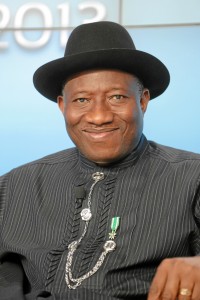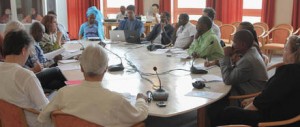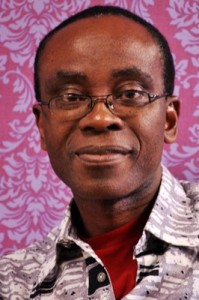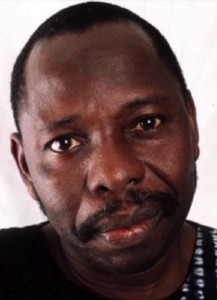President Goodluck Jonathan of Nigeria has been asked to take urgent action to end the large scale environmental pollution in Ogoniland, a group of oil-producing communities that cuts across Kana, Gokana, Tai and Eleme local government areas (LGAs) in River State.

Africa and Middle East Laureates of the Right Livelihood Foundation, who met recently in Cairo, Egypt, voiced their concerns about the ongoing land and sea degradation in Ogoniland and urged the Nigerian President to take action on the Ogoni UNEP (United Nations Environment Programme) report, three years after it was submitted.
The 2011 report has shown, for instance, that “in at least 10 Ogoni communities where drinking water is contaminated with high levels of hydrocarbons, public health is seriously threatened”.
The Laureates urged Jonathan to take action on the “full implementation of the recommendations of the UNEP report” taking into consideration “effective participation of the Ogoni people in all stages relating to the restoration of their environment”.
Similarly, the Laureates called on the Congolese government to stop permitting oil exploration in the Virunga National Park, a World Heritage Site and home to around a quarter of the world’s population of endangered mountain gorillas.

Though they endorsed the recent decision by British oil company, Soco International, to end its exploration work in the Park, they however feared that Soco’s withdrawal is not a total victory, describing the withdrawal as ambiguous, in the light of the fact that the company said it would complete its seismic survey in Lake Edward.
According to the Laureates, exploration licenses cover 80 per cent of the park and other companies may seek to develop resources in the Virunga. They called on the Congolese government to cancel Soco’s permit, to respect national laws and regulations outlawing oil exploration and extraction in protected areas, and to remove armed groups inside the park.
They also called on Soco to unambiguously give up its permit to explore within the park boundaries and to honour its commitment to respect all areas designated as World Heritage Sites by UNESCO.
While demanding a paradigm shift in agriculture and management of natural resources, the 11 Laureates at the four-day conference, declared: “In our diverse struggles toward improving access to health care, ending impunity, and achieving food security and sustainable development, we recognise an overarching crisis afflicting the region. Corporate capture of governance in Africa is becoming increasingly prevalent in the areas of agriculture and the extractive industries, namely mining, oil, and gas.”
They also called upon African governments to “make investments into infrastructure, health and education, especially in rural communities.”
“The Laureates appealed to the heads of states and governments of the African Union to “develop and implement the roadmap for the needed transition towards Ecological Organic Agriculture as promised by the African Heads of States and Governments in the Decision on Organic Farming”.
Additionally, they requested that “national governments implement the Maputo Declaration on Agriculture and Food Security that was declared in 2000, and redirect ten percent of national budget allocation to Ecological Organic Agriculture”.
The forum brought the Laureates together to share their experiences and struggles in their different areas of work: from human rights to environmental protection, women’s health, ecologically and socially sound agriculture, as well as justice and community healing after violent conflict. The event was the second in a series of regional meetings of Right Livelihood Laureates.

Director, Health of Mother Earth Foundation (HOMEF), Nnimmo Bassey, was one of the 11 Laureates at the conference. Bassey (RLA Laureate 2010) and late environmental rights activist, Ken Saro-Wiwa (RLA Laureate 1994), are awardees of the Right Livelihood Award Foundation.

While Saro-Wiwa was decorated “for striving non-violently for civil, economic and environmental rights of his people,” Bassey was honored “for revealing the full ecological and human horrors of oil production and for his inspired work to strengthen the environmental movement in Nigeria and globally”.
